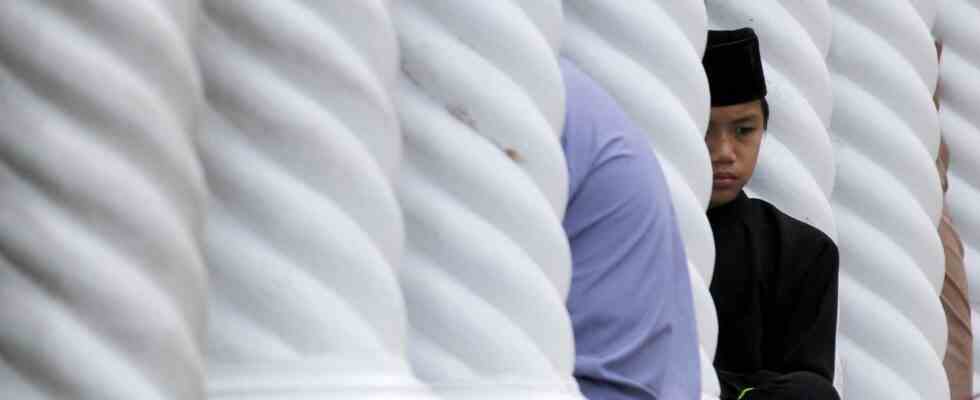Status: 12/17/2022 1:39 p.m
Brunei has been using Sharia for years – the introduction of it caused sharp international protest. In private, the sultanate allows a lot of freedom – but minorities worry that this will not last.
In Germany, the decorated Christmas tree in the hotel lobby would be something normal. In Brunei it is a rarity. Should the state inspectors come, she would have to dismantle it again, explains hotel manager Miriam Wolber. Christmas carols or flashy decorations have been banned since 2014.
Christmas chocolate can only be found sporadically in western supermarkets. Because the state religion in the Sultanate of Brunei, which has around 400,000 inhabitants, is Islam. Christmas celebrations could “damage the faith of the Islamic community,” according to the Ministry of Religion’s introduction.
The Christian festival is therefore forbidden in public. Theoretically, there is a risk of up to five years in prison or a large fine. However, at home and in the church, people are free to do whatever they want.
Sharia regulations apply on Brunei’s roads. Privately, however, citizens are allowed to follow their own rules.
Image: ARD Singapore
Different rules apply at home
This seems to be a basic rule that runs through many areas in Brunei. A country that is about twice the size of Saarland. Many things are officially forbidden in the sultanate. In private, however, it is not punished.
Islamic Sharia law, which prohibits alcohol, abortion or adultery, has been in force since 2014. Since 2019, thieves have been at risk of having their hands or legs amputated, and gay men have been at risk of being stoned to death.
The introduction of Sharia law caused a great deal of international excitement. Celebrities like George Clooney and Elton John called for a boycott of the Sultan’s international hotels – in the USA, London or Paris.
“Bad at enforcing laws”
But for the people of Brunei, the introduction of the law has changed little. It was taboo before and has not been punished more severely since then. This is what a man who is bisexual and affected by the new law says. “Brunei is just really bad at enforcing the law,” he says.
At private house parties of the LGBTQI community in Brunei, there are always raids. “But the worst we face is a few hours in jail or a fine of around 1,000 Brunei dollars, no stoning.” The lawsuits would mostly be dropped over time.
The hurdle for a conviction is very high, even the sultanate explained, since it needs several witnesses of “high moral rank and piety”. It’s more of a deterrent.
“The threat is still there”
The fear is there, says a woman from the LGBTQI community. “It’s still the same as it was when the law was introduced because the threat, the insecurity is still there.”
Phil Robertson, deputy Asia director at Human Rights Watch, doesn’t see the danger over. “It’s like leaving a loaded gun in kindergarten. Maybe someone comes and plays with it and it goes off.”
One of the last absolute rulers
Few believe that the current Sultan Hassanal Bolkiah is capable of that. He is popular with the people, is considered to be close to the people. When driving through the city, he likes to be at the wheel himself. People wave at him and want to take selfies with him.
The 76-year-old has been the longest-reigning monarch in the world since the Queen’s death. It should not be forgotten that the sultan is also one of the last absolute rulers in the world. Every decision goes through his desk.
The parliament with its 36 members meets only once a year and only has an advisory function. There is no real opposition or social movement criticizing the royal family.
Brunei’s sultan is held in high esteem by the people. But the crown prince is met with skepticism.
Image: picture alliance/dpa/XinHua
Skeptical looks at the crown prince
That could change with the next change of throne. Because Crown Prince Muhtadee Billah is not as popular as his father. Many question his competence behind closed doors.
Nobody wants to talk about it openly. The red lines in Brunei are royalty and religion. Many say they are afraid that someone at the next table will overhear.
Prosperity dampens criticism
There is also little criticism because most people are doing well. The Sultanate’s wealth stems from its oil and gas reserves. Much is financed from this.
The people of Brunei pay neither income tax nor VAT. Education is free and they only have to put a dollar on the table to see a doctor. Rice, sugar and flour is subsidized. A liter of diesel costs the equivalent of 37 cents.
The education system in Brunei is high – and attending school is free.
Image: picture alliance / dpa
Away from oil and gas – but how?
But the question is how long Brunei can keep this welfare state going. Spending is already being cut. The country needs to diversify its economy – away from oil and gas and towards renewable energies, agriculture and tourism.
More than 70 percent of Brunei is covered by rainforest, with many rare animal and plant species. The Sultan also encourages the creation of start-ups. But future issues are not yet being addressed with the necessary urgency, says geologist Bong Poh Yuk, who has worked for state oil companies for almost 40 years.
He and others estimate that oil and gas reserves will certainly last another 15 to 20 years. New technologies would also help to develop other small oil fields.
But at some point the last drop is pumped. Very few people in Brunei want to give this a serious thought. In the new year, instead, we celebrate first. One of the Sultan’s daughters is getting married.

